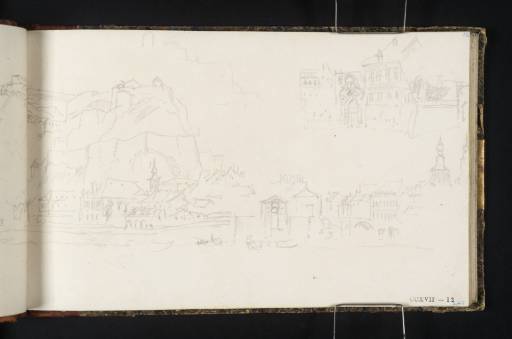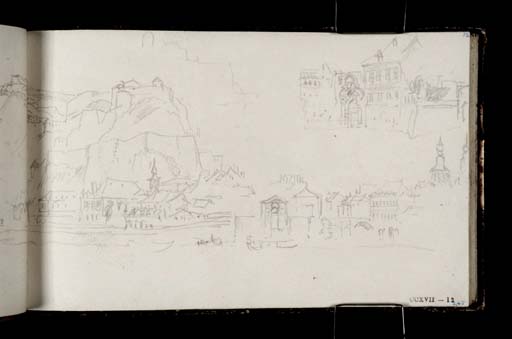Joseph Mallord William Turner The Confluence of the Meuse and the Sambre at Namur, Looking Upstream 1824
Image 1 of 2
Joseph Mallord William Turner,
The Confluence of the Meuse and the Sambre at Namur, Looking Upstream
1824
Joseph Mallord William Turner 1775–1851
Folio 13 Recto:
The Confluence of the Meuse and the Sambre at Namur, Looking Upstream 1824
D20105
Turner Bequest CCXVII 13
Turner Bequest CCXVII 13
Pencil on off-white wove paper, 99 x 162 mm
Watermark ‘[...]lls | 1[...]’
Inscribed in blue ink by Ruskin ‘13’ top right and ‘247’ bottom right
Stamped in black ‘CCXVII–13’ bottom right
Watermark ‘[...]lls | 1[...]’
Inscribed in blue ink by Ruskin ‘13’ top right and ‘247’ bottom right
Stamped in black ‘CCXVII–13’ bottom right
Accepted by the nation as part of the Turner Bequest 1856
References
1909
A.J. Finberg, A Complete Inventory of the Drawings of the Turner Bequest, London 1909, vol.II, p.682, as ‘Namur (?)’.
1975
Malcolm Cormack, J.M.W. Turner, R.A. 1775–1851: A Catalogue of Drawings and Watercolours in the Fitzwilliam Museum, Cambridge, Cambridge 1975, p.64 no.41 note 1, [p.68].
1991
Cecilia Powell, Turner’s Rivers of Europe: The Rhine, Meuse and Mosel, exhibition catalogue, Tate Gallery, London 1991, p.158 no.93.
This panoramic view of Namur is continued on the folio opposite (Tate D20104; Turner Bequest CCXVII 12a). At left is Namur’s mighty citadel, dominating the city from atop a high promontory. A stronghold has commanded this site for centuries, defending the Meuse valley from invasion since the Roman occupation.1 Turner sketches the contours of the citadel’s towers and curtain walls again in light pencil directly above the principal view.
Buildings line the riverbank at the foot of the citadel; the most notable of these is the old Hospice Saint-Giles, now used as the headquarters of the Walloon Parliament. To the right a pedimented aedicule comes into view: this is the Porte de Sambre et Meuse, an eighteenth-century arched gateway decorated with allegorical figures representing the two rivers in celebration of their union at Namur. There appears to be a detail of the Porte and the sixteenth-century Halle al’Chair (now Namur’s Archaeological Museum) at top right. Further to the right, identifiable by its two distinct spires, is the Hospice d’Harscamp (see also Tate D20108, D29631; Turner Bequest CCXVII 15, CCXCVI 18). The d’Harscamps were a Belgian aristocratic family whose wealth was accrued during the Thirty Years War.2 They endowed a number of local charitable institutions in Namur, including this, a place of hospitality and care for the sick, wounded, or dying.3
Alice Rylance-Watson
January 2014
‘Namur: the citadel’, Trabel, accessed 22 January 2014, http://www.trabel.com/namur/namen-citadel.htm
‘La Famille d’Harscamp’, Harscamp, accessed 22 January 2014, http://www.harscamp.be/index.php/Historique-de-la-Fondation-d-Harscamp/La-famille-d-Harscamp
‘De l’Hospice à la Maison d’Harscamp’, Harscamp, accessed 22 January 2014, http://www.harscamp.be/index.php/Presentation/de-l-hospice-a-la-maison-d-harscamp.html
How to cite
Alice Rylance-Watson, ‘The Confluence of the Meuse and the Sambre at Namur, Looking Upstream 1824 by Joseph Mallord William Turner’, catalogue entry, January 2014, in David Blayney Brown (ed.), J.M.W. Turner: Sketchbooks, Drawings and Watercolours, Tate Research Publication, April 2015, https://www


